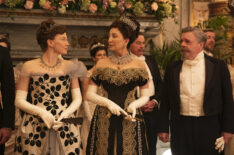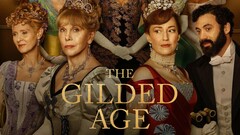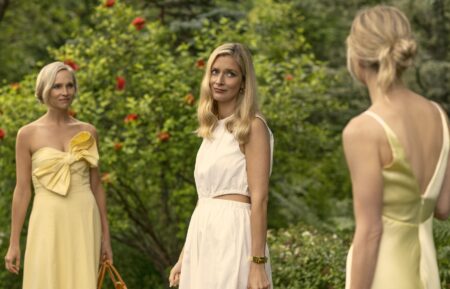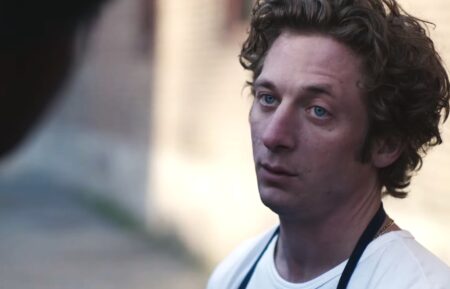‘The Gilded Age’: Christine Baranski, Cynthia Nixon & More Tease a ‘Tectonic Shift’ in Season 2
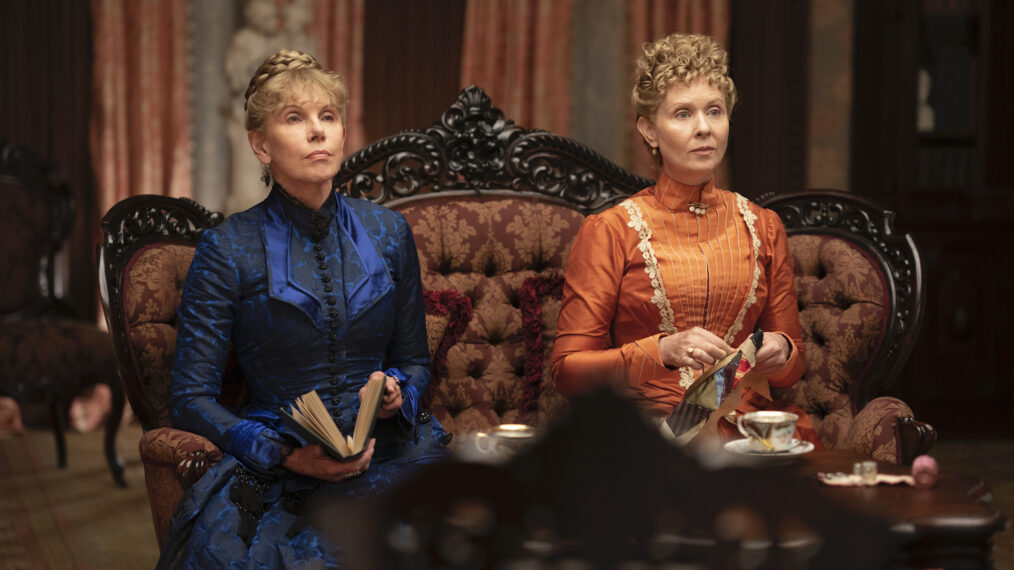
Preview
The Gilded Age Season 2 will be sauntering onto our TVs bustles and all before we know it. The second season of the glitzy HBO drama has begun filming in New York and Rhode Island. And while it’s too early to have a release date for The Gilded Age Season 2, it’s never too early to pick the brains of the cast.
TV Insider caught up with creator Julian Fellowes (Downton Abbey) and stars Christine Baranski, Cynthia Nixon, Louisa Jacobson, and Denée Benton on the red carpet of an FYC event for the series on Tuesday, May 24 in New York, and they teased what’s to come in The Gilded Age Season 2. But first, here’s what we already know, thanks to HBO.
The fierce rivalry between new and old money barrels on as George and Bertha Russell (Morgan Spector and Carrie Coon) remain determined to reach the highest echelons of New York society. Marian Brook (Jacobson) will continue trying to make her way through her new-ish social scene as her old money aunts, Agnes van Rhijn (Baranski) and Ada Brook (Nixon), try to navigate it for her. And Peggy Scott (Benton) will continue to forge her own path in the world of the Black elite.
“In this glittering world on the brink of the modern age,” the logline asks, “will the established rules of society prevail, or will the game change entirely?” The cast has some opinions about that.
For the ever-stubborn Agnes, changing her perspective would take a lot. As Baranski explains, “the stakes would be very high for her to have to change. It would have to do with losing forever something that she realizes she loves and what the cost of being too stubborn is. There’s a price tag on everything, and if you dig in your heels in too deep on anything you can find yourself alone. And that’s all I’ll say.”
As for the gentle Ada, Nixon hints at a potential conflict between the two sisters. Could it be the price Agnes isn’t willing to pay?
“Without trying to say too much, there are things that happen in this season that make a tectonic shift in the power dynamics of those sisters,” Nixon reveals. “It’s one of the things I’m most excited about in this season.”
While Ada’s unmarried fate is a tragedy in the eyes of many Gilded Age characters, Nixon says Ada is inspired by the progressiveness of the time, noting Marian and Peggy as her main inspirations on that front.
“The thing about the Gilded Age, it was certainly the onset of these unbelievably wealthy people, but it was also a time when social mores were changing and there were a lot of people advocating for a lot more freedom and inclusion,” she says. “I think a lot of that is very exciting to Ada, and she’s going to get in there as much as she can.” Ada will see this forward movement and see it as an opportunity to right the wrongs of her past.
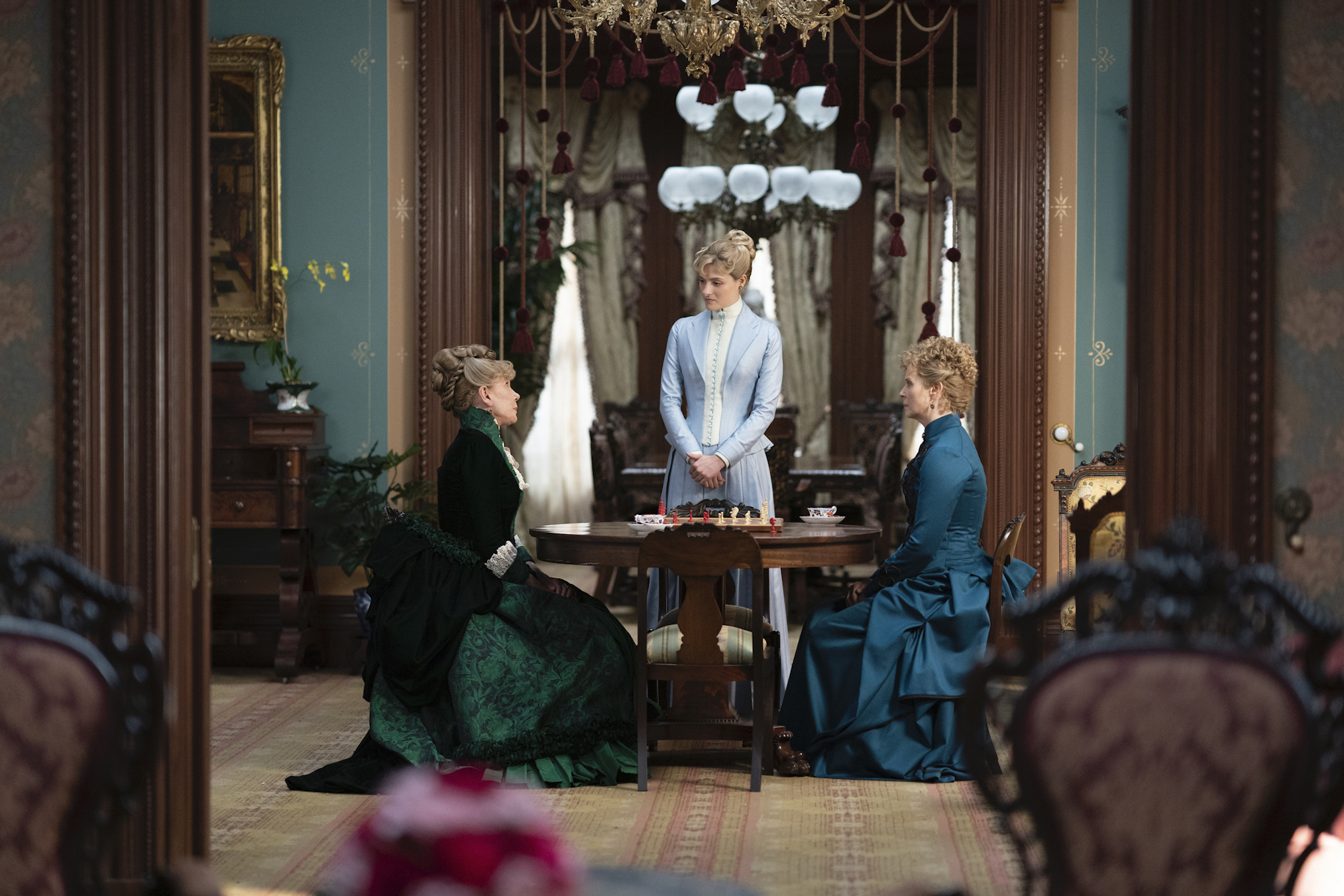
Alison Cohen Rosa/HBO
“Ada is not a person who sits around feeling sorry for herself, but I do think that because of all the disruptions of her early life — the death of her parents, her brother losing the house, losing the fortune — I think she felt like her life fell between the cracks,” Nixon shares, later adding, “Certainly, with Marian’s entrance into our family and our home, it really gave Ada a chance to have the child she never had and to nurture that child as she wishes she had been nurtured. I don’t think Ada sits around feeling sorry for herself, but I think she feels like a lot of her life was a missed opportunity.”
Speaking of past wrongs, Peggy’s discovery that her son is alive was the most shocking moment of The Gilded Age Season 1 finale, made all the more alarming by the fact that her own father, Arthur Scott (John Douglas Thompson), was the one who concealed the truth.
When asked if Peggy now thinks it’s possible for her estranged husband to return now that she knows their child is alive, Benton says, “There’s so many questions about loose ends for Peggy, but I thinking finding out that her child is alive is probably all she’s thinking about right now. Anything else will be something that I discover just like the rest of you.”
Her friendship with Marian, however, will endure.
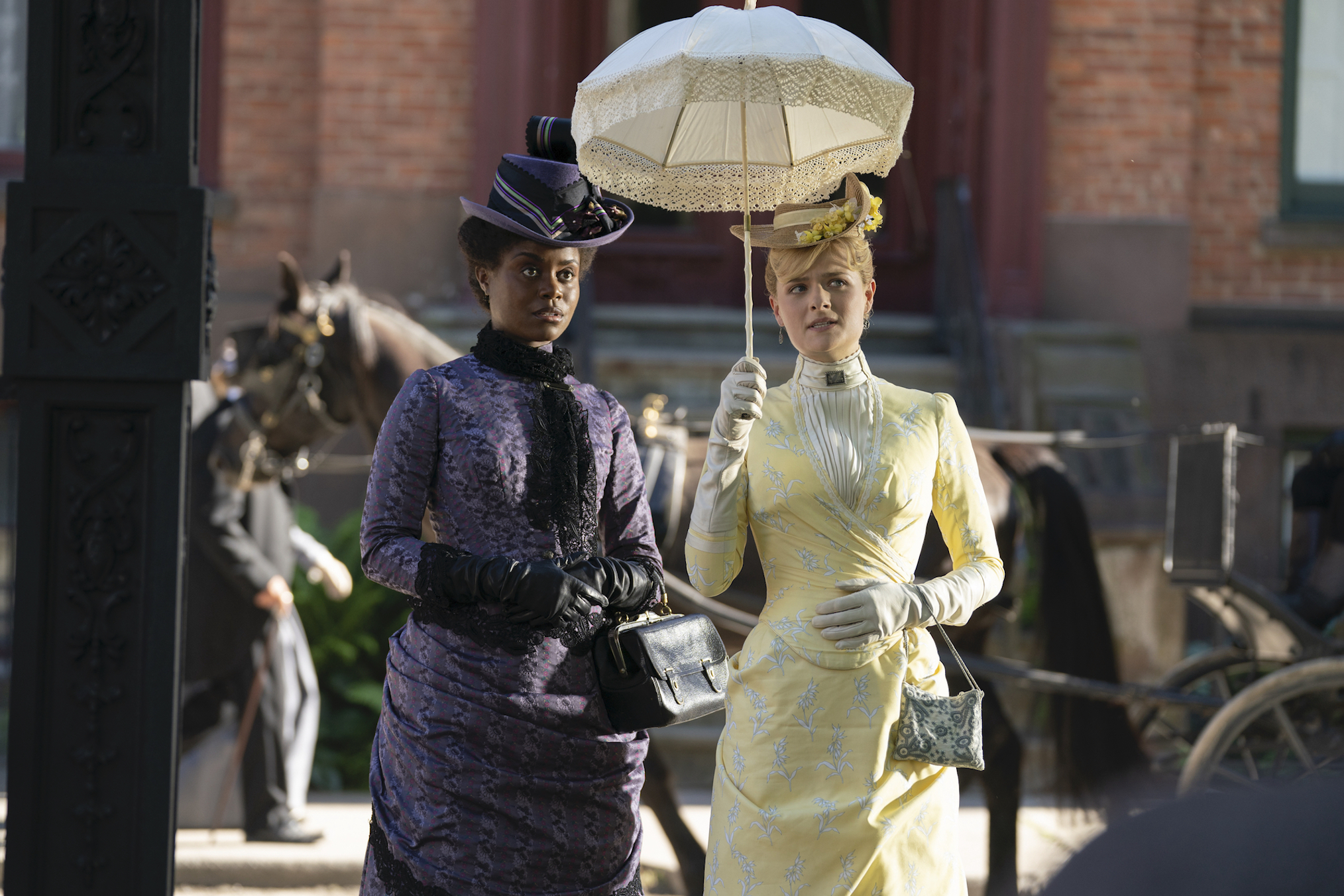
Alison Cohen Rosa/HBO
“By the end, [Peggy and Marian] help each other through these huge traumas — being essentially left at the altar, finding out about her baby. I think they’re going to find a way to stay connected. I see them continuing to be safe spaces for each other,” says Benton.
Marian was to elope with Mr. Raikes (Thomas Cocquerel) in the Season 1 finale, but he brutally jilted her. At the end of the episode, Marian seemed to be OK, but Jacobson says she’s “definitely” putting on a strong front.
“I think she’s really, really hurt. But Marian, in general, is a very optimistic person,” Jacobson shares. “She sees the best in everyone and in all of these situations, but is super strong. At the end, she’s devastated but looking toward a brighter future, and I’m hopeful that she’ll see one.”
As for Marian’s aunties, it seems almost impossible that Marian and Agnes could get on the same page. Marian and Ada are much more similar, and, according to Jacobson, “on a similar wavelength.”
“Ada has compassion and patience, and Marian does too, but she’s young,” she notes. “Marian can learn how to be patient and compassionate with Agnes from Ada.”
Some of the show’s glitzy drama will include Agnes and Mrs. Astor (Donna Murphy, now a series regular for Season 2) trying to save the old opera house. Baranski says she and Murphy can’t wait to share more scenes together — in fact, they’ve been emailing about it and are “fangirls of each other” — and she can’t imagine a better actor in the role.
“I think she’s rather perfect as Mrs. Astor,” Baranski says. “She has that natural hauteur.”
Their efforts to keep new money out of New York, of course, will fail. And Baranski says Agnes wouldn’t hate to learn what those “new money” families (the Vanderbilts, Carnegies, etc.) did for New York City, explaining, “Money can do a lot of really good things. She may be appalled by the ostentatious way in which they spend their money, but those families created a real culture in America for people to enjoy — books and music and art.”
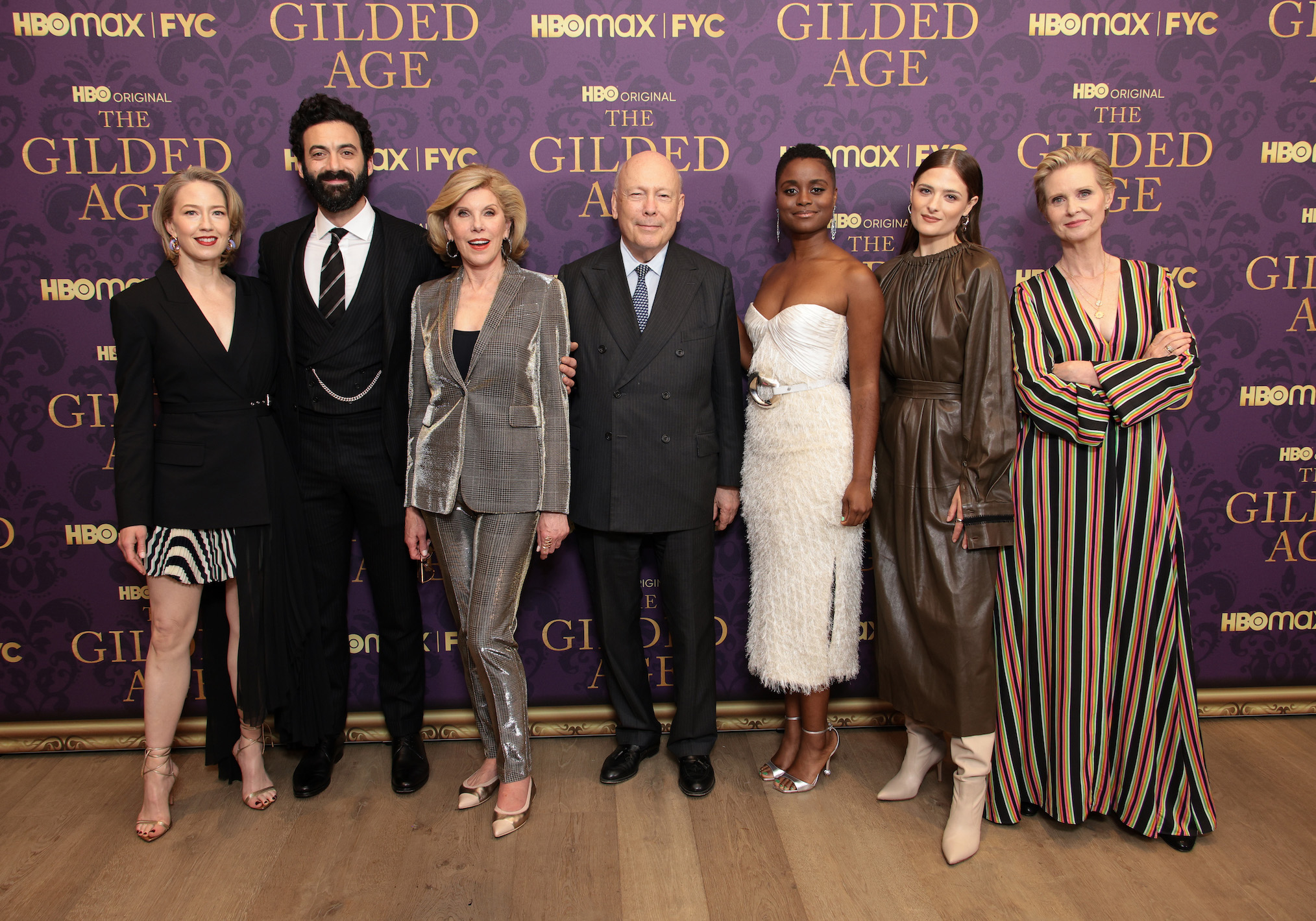
Dimitrios Kambouris/WireImage
This cultural forward movement is what made Fellowes want to make The Gilded Age in the first place (and before Season 1 began, he had tried to for 10 years to get it going).
“Downton Abbey is a warm show about a class, a civilization, a group of people who were beginning their decline, they were ceasing to have control over public matters. And by the end of the ’60s, their control was essentially gone,” he says. “That sort of gentle decline is the sort of base note of Downton, whereas Gilded Age, the absolute opposite. It’s about a group of people who are beginning to feel their strength and flex their muscles and take control. They were not consciously preparing, of course, but with the advantage of hindsight, they were preparing for the next century which they would control. And the 20th century would be the century of America more than anyone else.”
“In the ’70s, ’80, ’90s after the Civil War was done, you see that happening,” he continues. “These men arriving, making the money. These women building their palaces, changing society, making up a new way of doing these things that wasn’t a pale imitation of Europe but was a different way. It was an American way. I find all that rather exciting, really.”
The Gilded Age, Season 1, Streaming Now, HBO Max; Season 2, TBA, HBO
From TV Guide Magazine
How 'Countdown' Recruited Jensen Ackles to Go Full 'Die Hard'
Countdown boss Derek Haas talks creating the character around Ackles, and the cast teases the “Avengers”-like team of the crime thriller. Read the story now on TV Insider.


